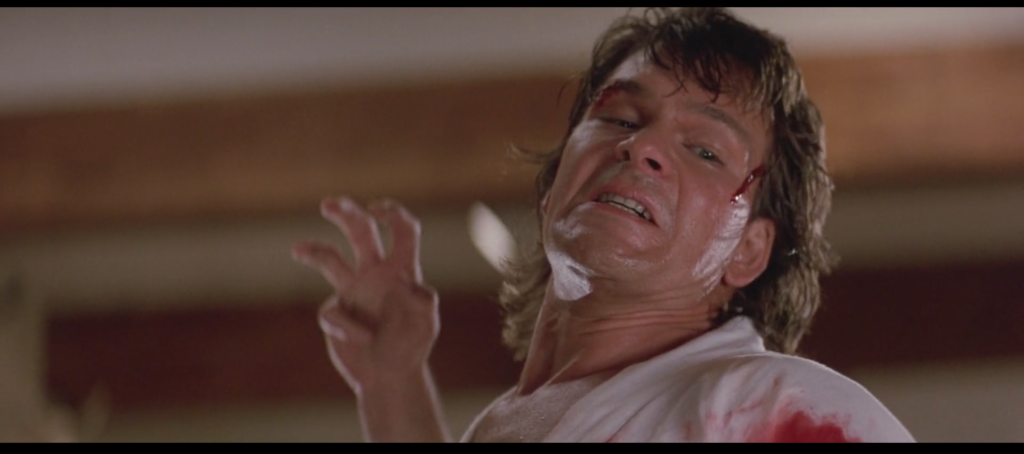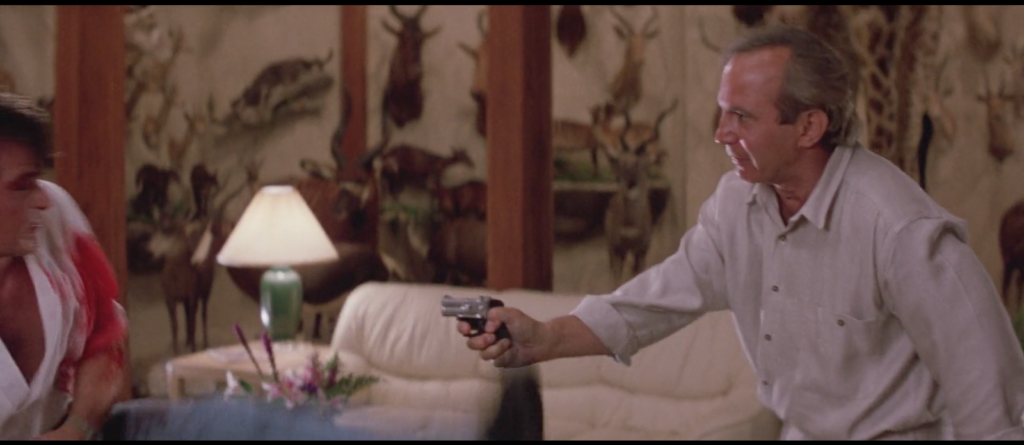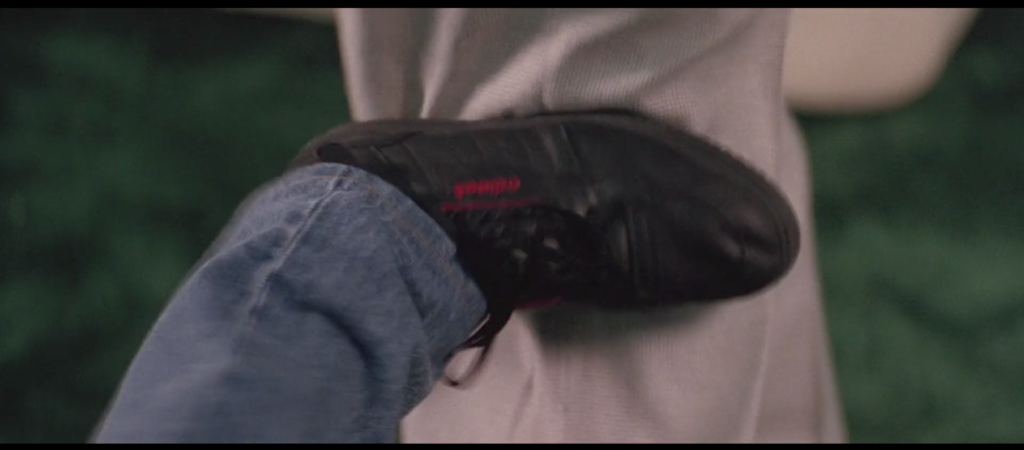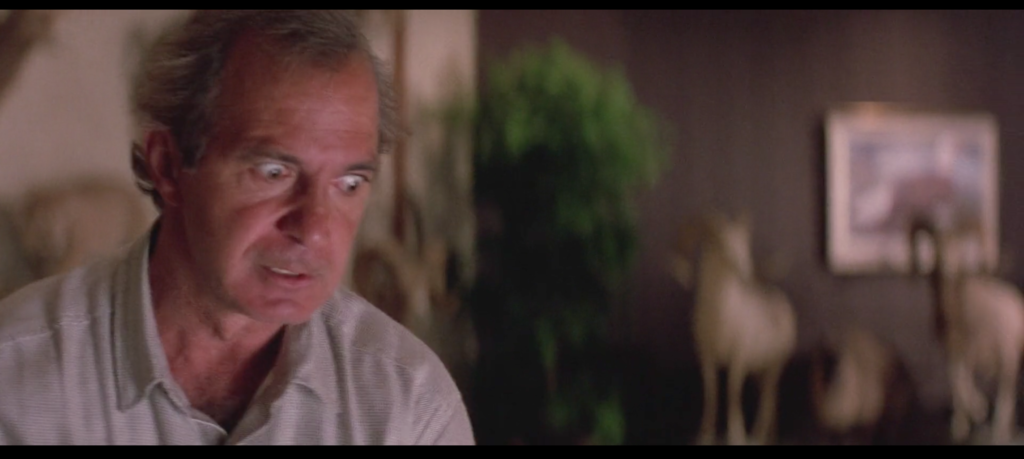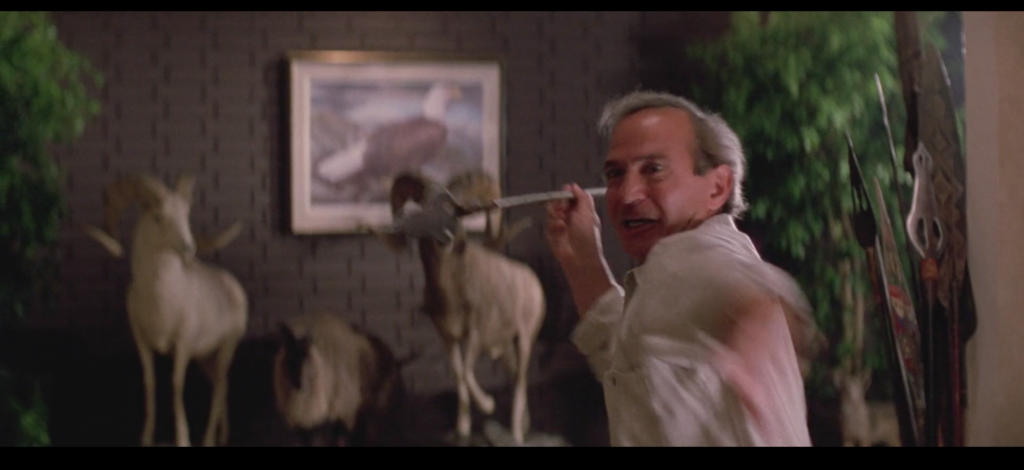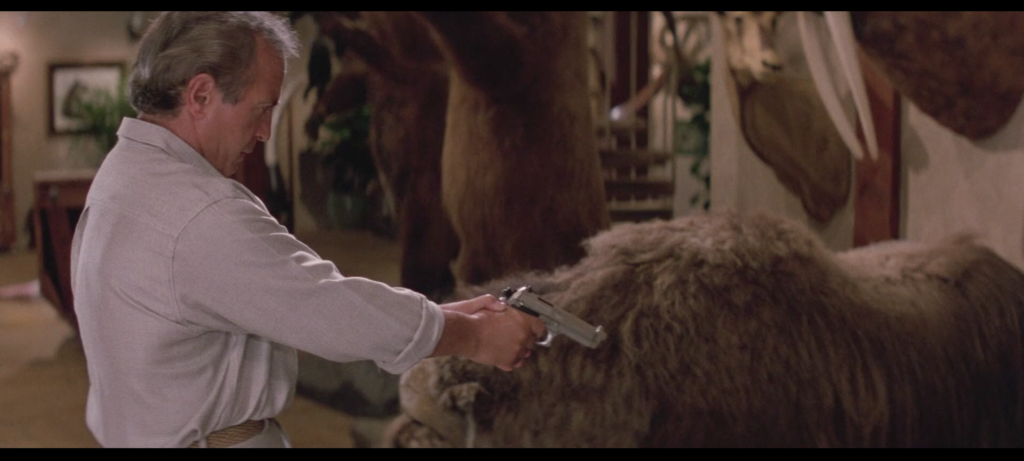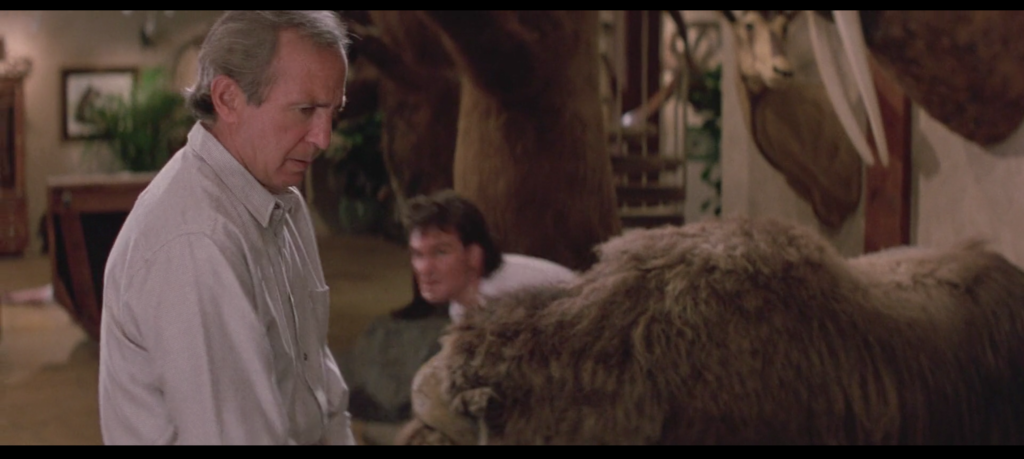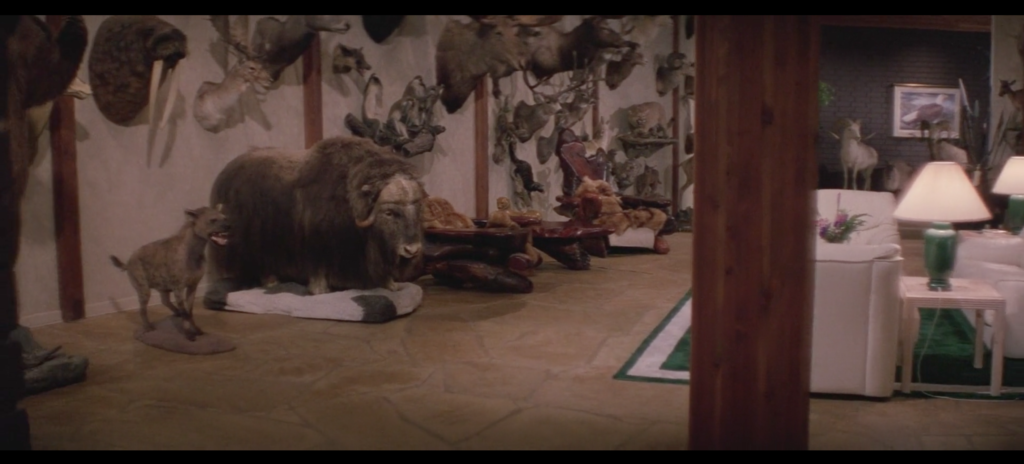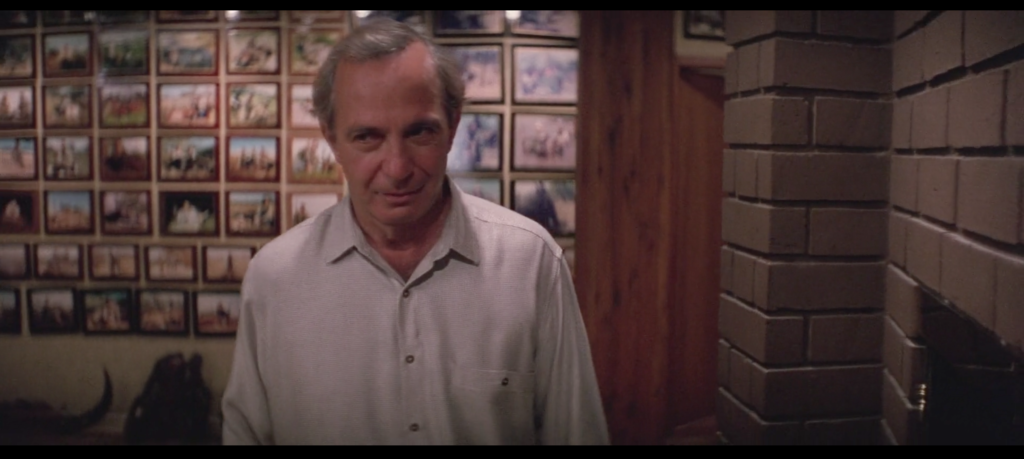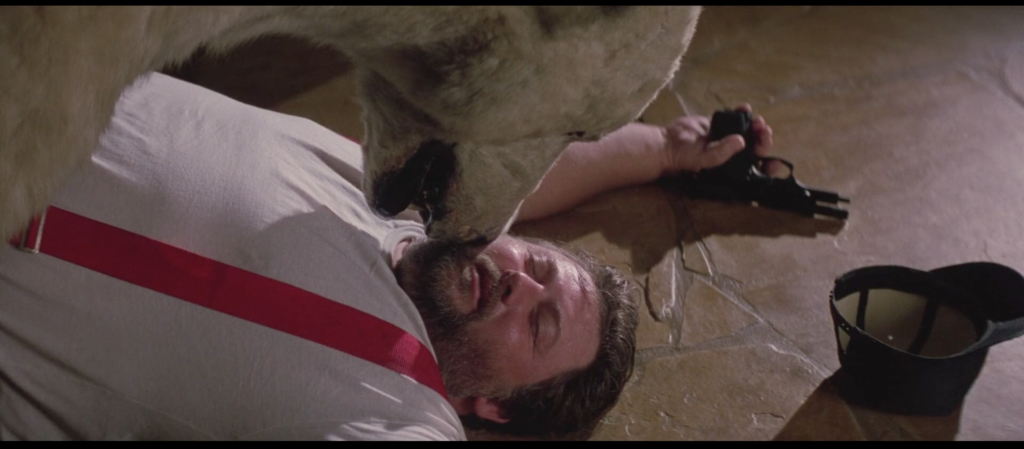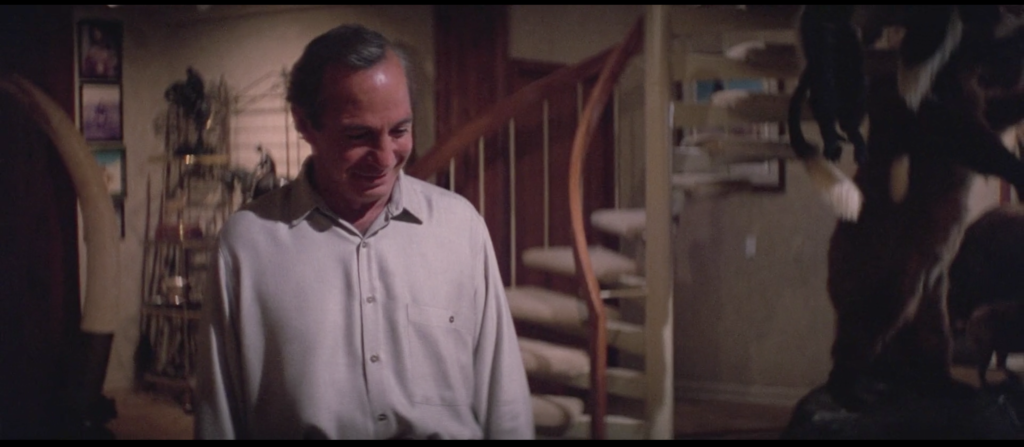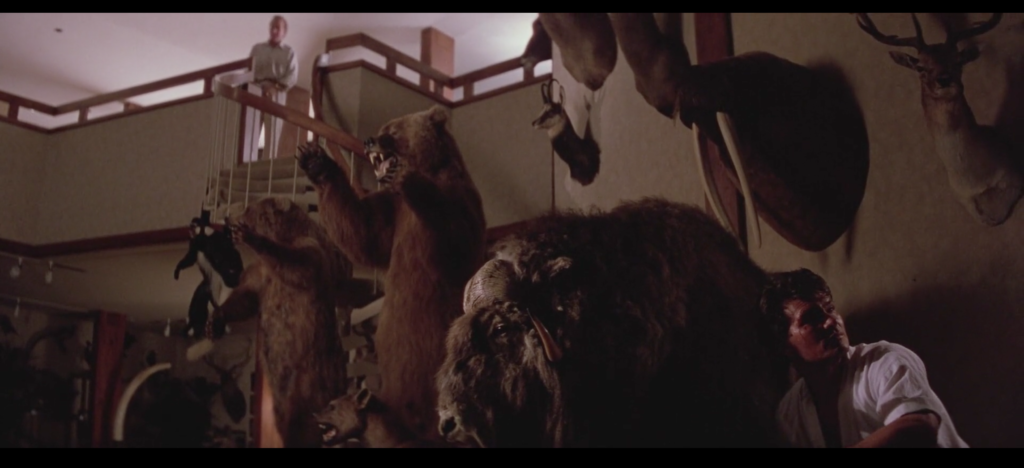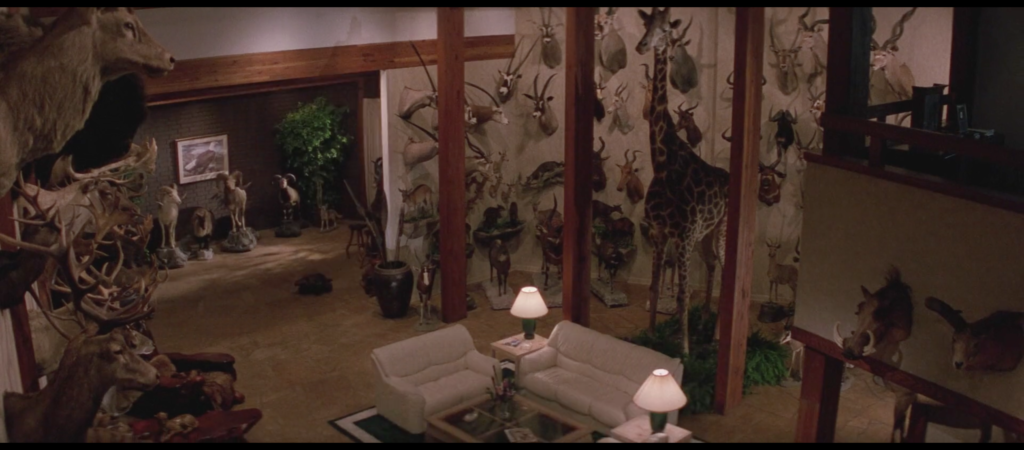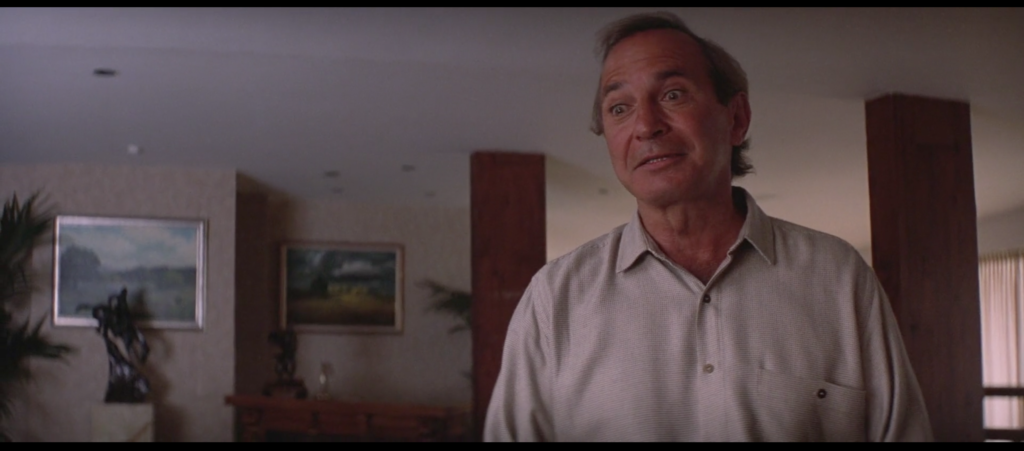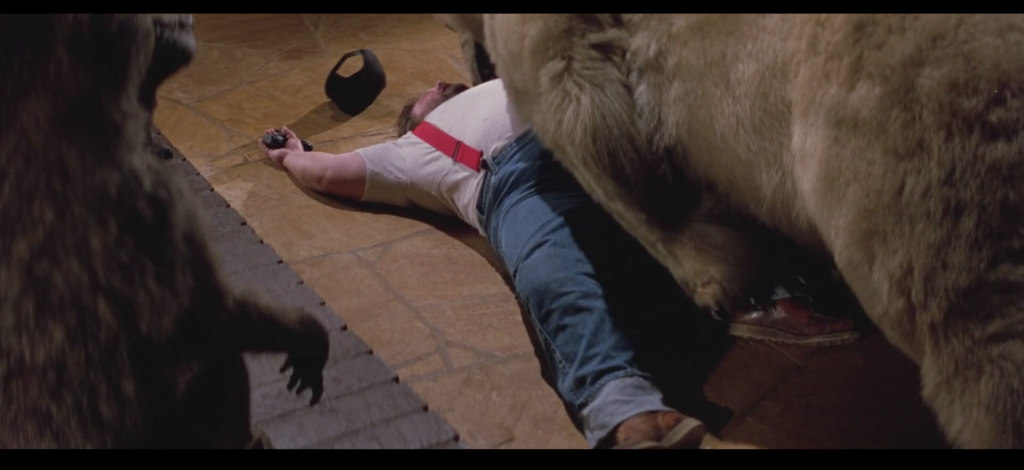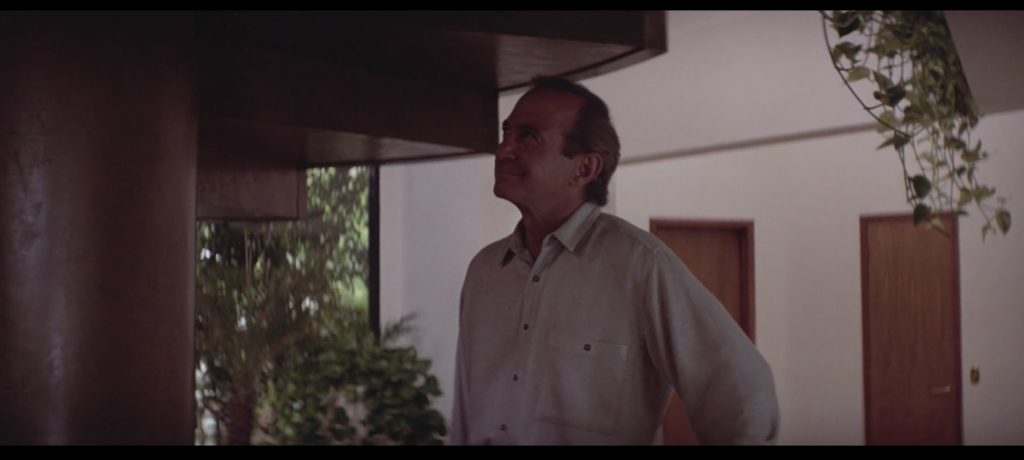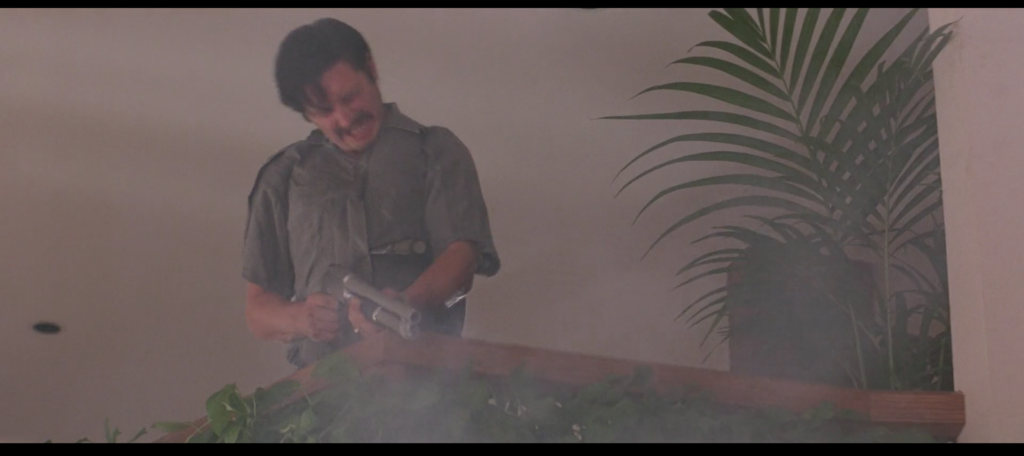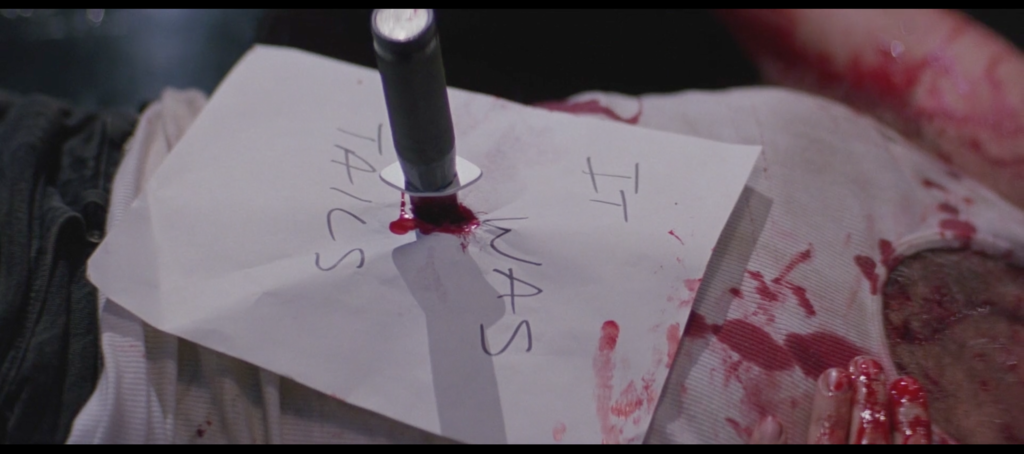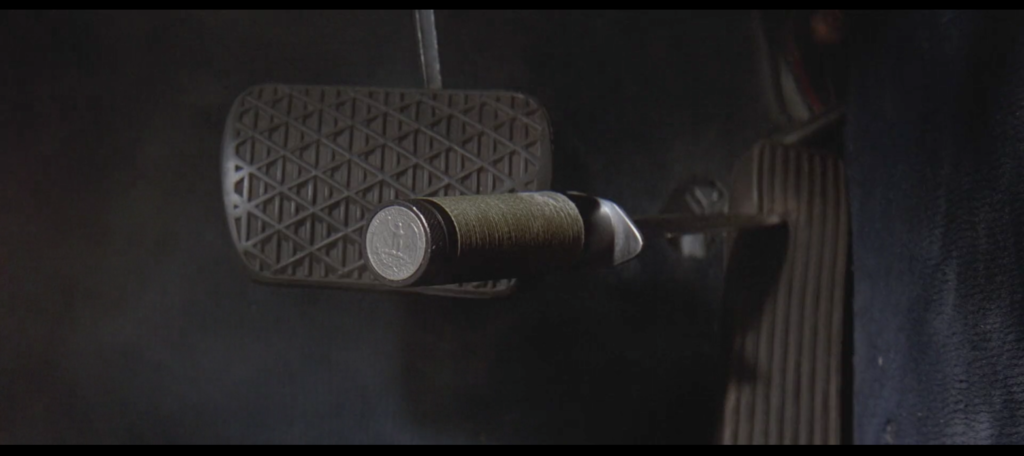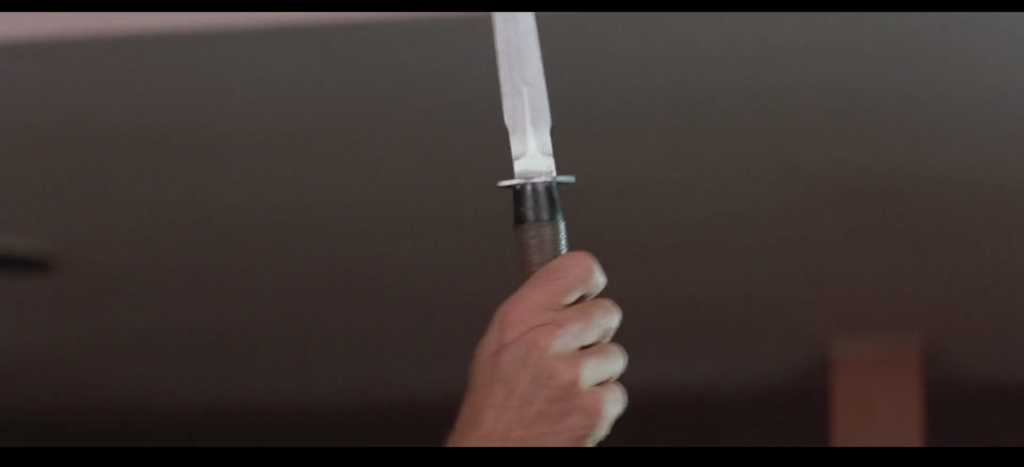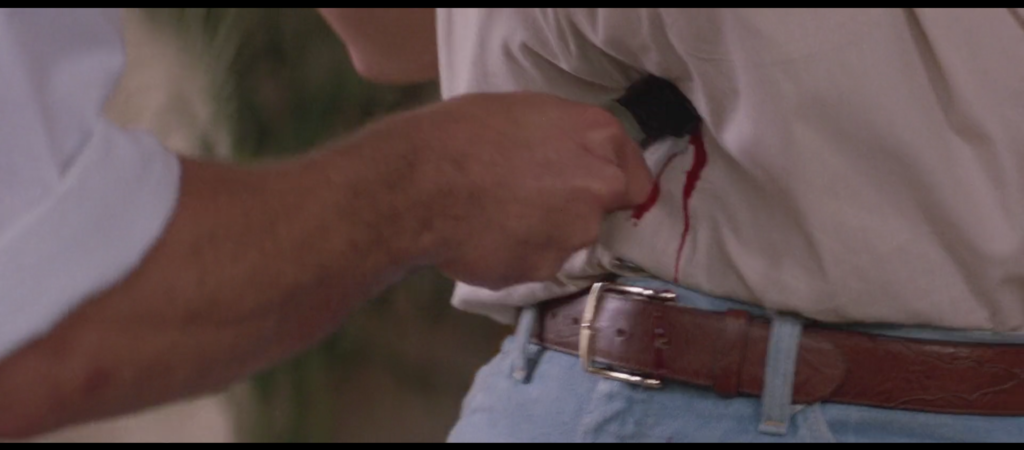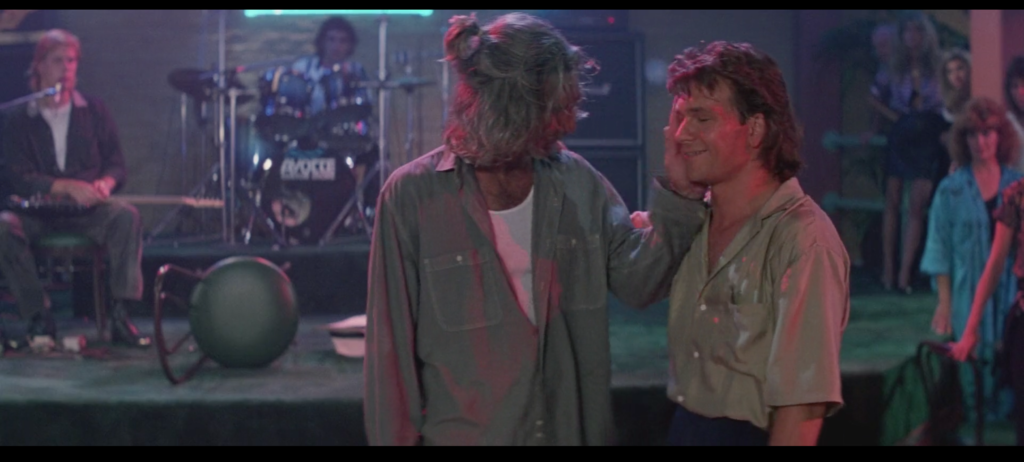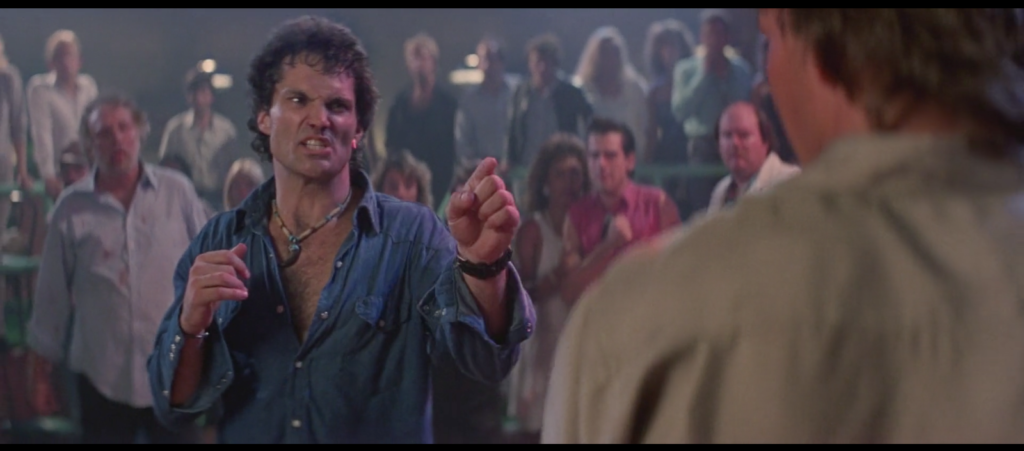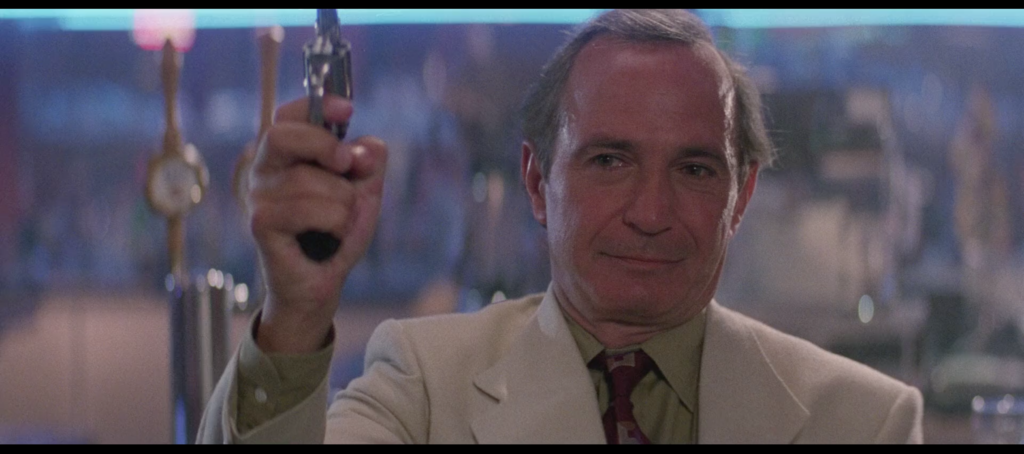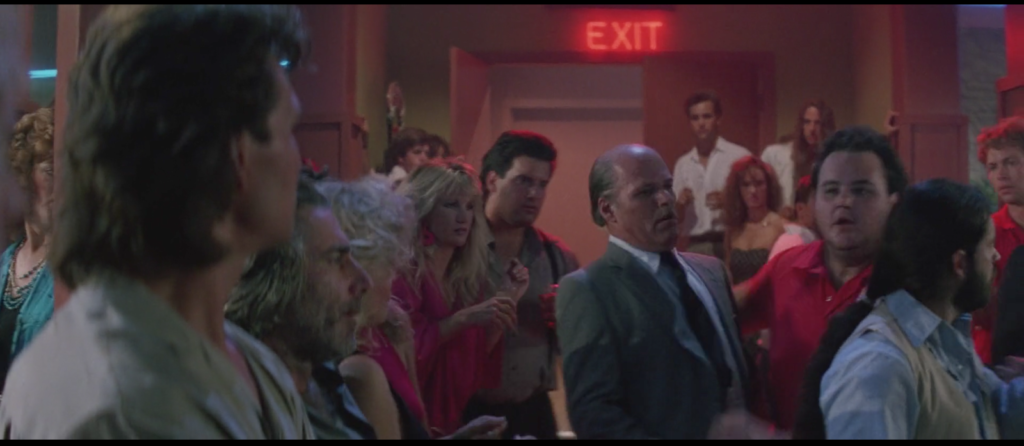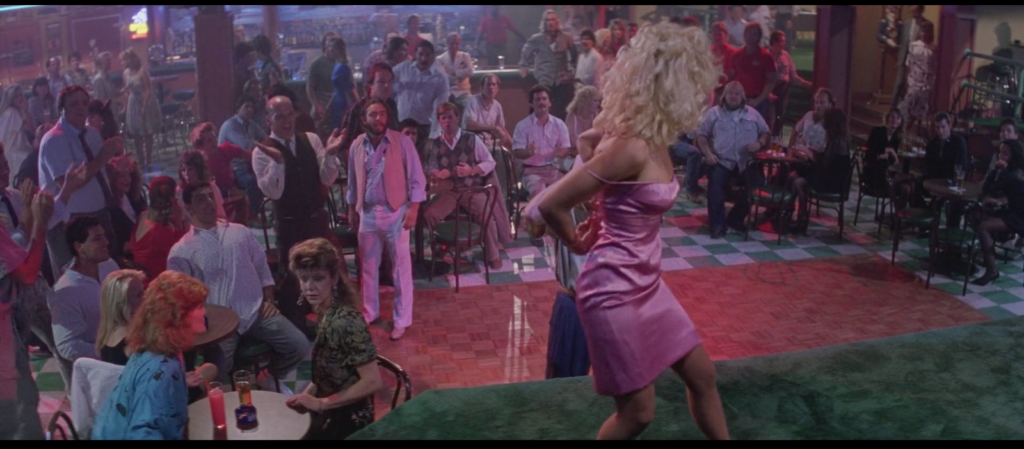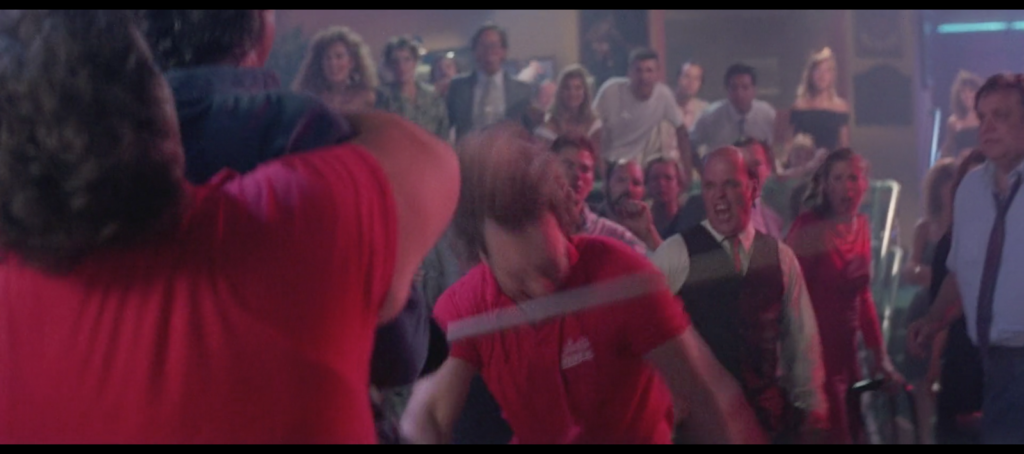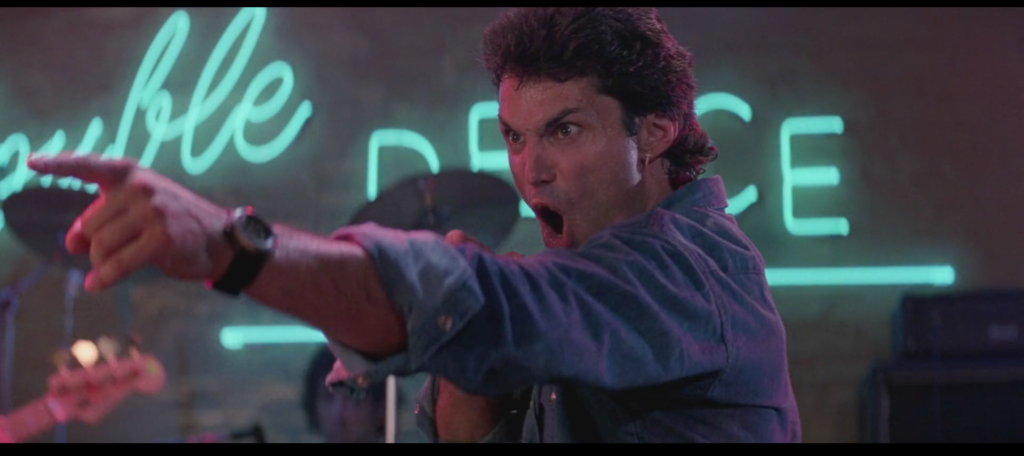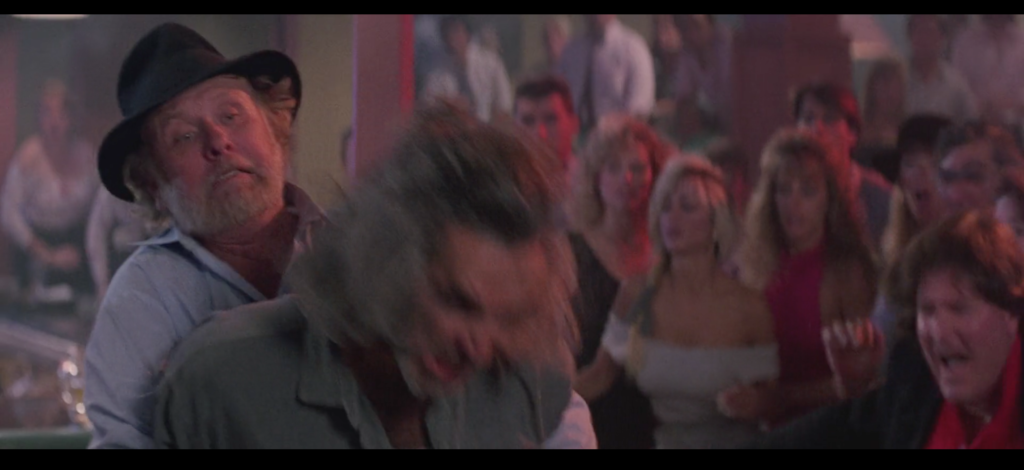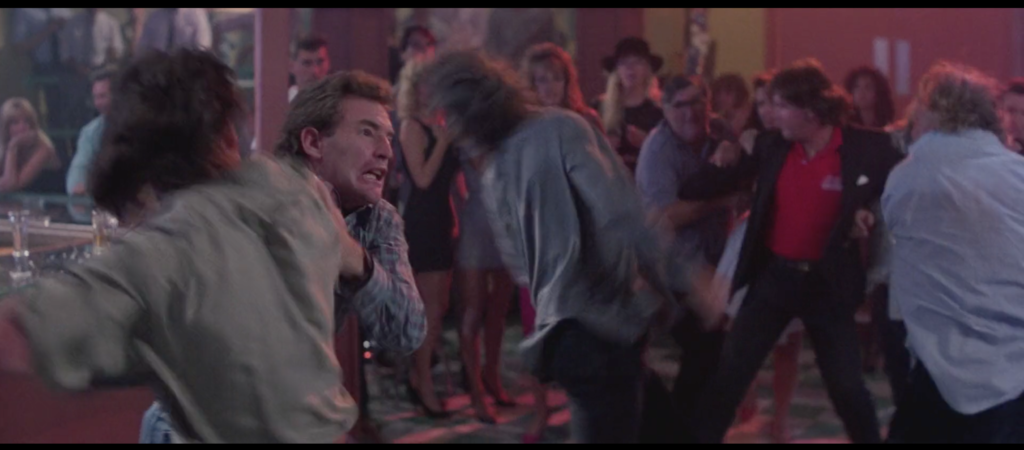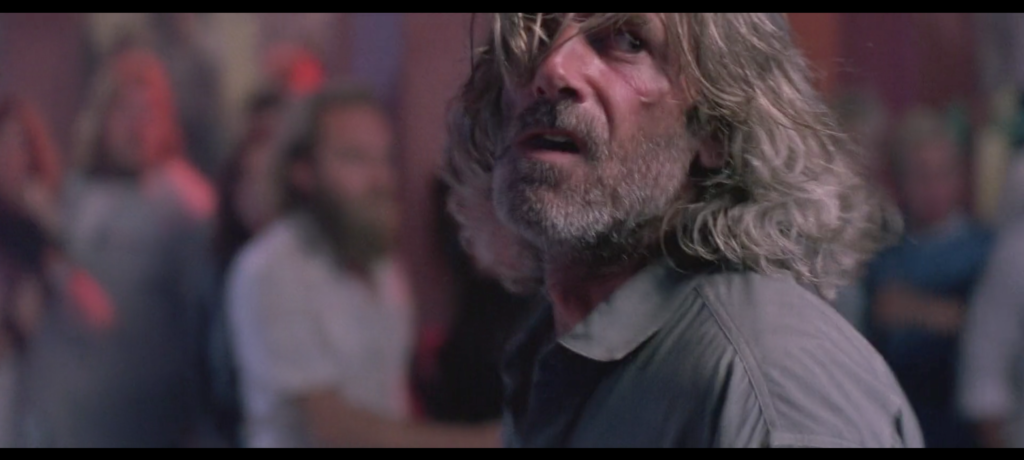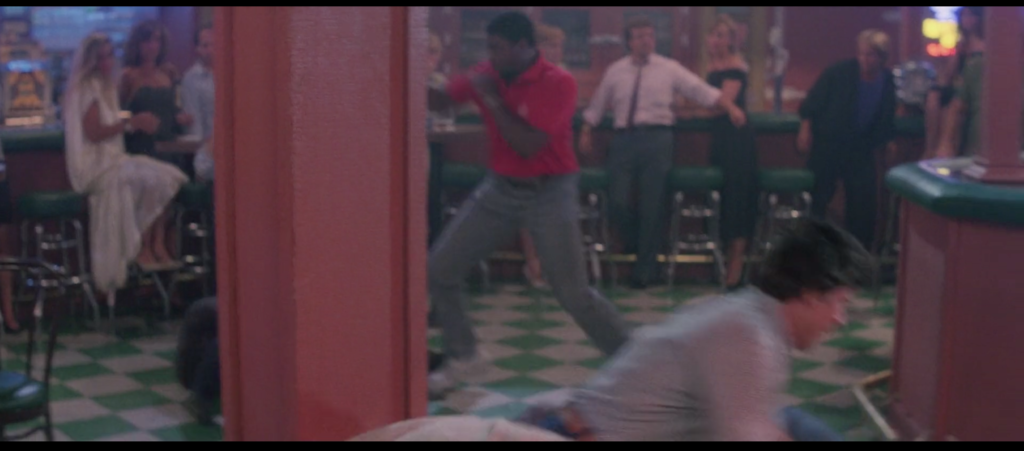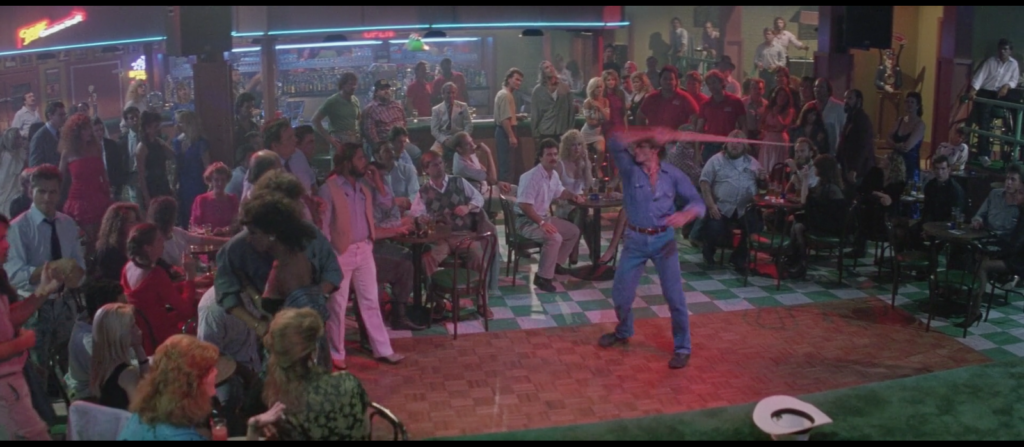Posts Tagged ‘fight scenes’
345. Hesitation
December 11, 2019It’s finally happened. Dalton has gotten the drop on Brad Wesley, for good and all. He’s disarmed him, he’s kicked him into a chair, he’s pinning him down by the chest with his knee, and he’s left him with no place to move or hide. Instinctively, Dalton’s right arm pulls back, his fingers in a claw-grip position. You know what’s coming next—you’ve known it since you saw what happened to Jimmy, or heard about what happened in Memphis, or even when you saw Hank the bouncer tell Horny Steve the legend when Dalton first arrived at the Double Deuce. Brad Wesley is about to get his throat ripped out.
But this never happens. On the verge of a final, total, horrible victory, Dalton hesitates. He finds he cannot pull the throat out of a man who’s unarmed and helpless before him. He’s murdered five of the man’s minions and fought a pitched battle to get to this very moment, but when he gets there, there’s no Frodo claiming the Ring as his own for Dalton. He resists the temptation. He stays his hand.
Which, hey, good for him. One less murder to worry about!
But…look, I don’t want to come across as endorsing the act of ripping an unarmed man’s throat out to punish him for his crimes against auto shops and dive bars. That would be wrong. Still, I can’t help but feel that Dalton’s gotten this a bit backwards. Jimmy, Morgan, O’Connor, Ketcham, Pat McGurn: They were just following orders. Brad Wesley was giving those orders. He didn’t wield the knife that killed Wade Garrett, but it was his coin toss that decided the cooler’s fate. He didn’t plant the explosives at Red’s Auto Parts or Emmett’s cabin, he didn’t drive the monster truck over Strodenmire Ford, he didn’t personally start several vicious barfights, but he was the architect of it all, just as surely as he was the architect for the coming of the JC Penney.
And here Dalton hesitates? Here he develops doubt about the act of ripping a guy’s throat out? Is it truly a moral victory to slaughter five men but spare the one who put them in harm’s way to begin with?
344. “I just don’t have the time”
December 10, 2019“I thought it would be fun to fight you, Dalton,” says Brad Wesley. “I really did.” He says this right after getting his knee smashed, which presumably made him reevaluate the relative fun-ness of fighting Dalton. “But now,” he adds, pulling his very small backup gun, “I just don’t have the time.”
Does this exchange sound familiar? It should: Jimmy pulled off a very similar conversational gambit at the end of his own fight with Dalton. “I’m gonna kill you the old-fashioned way,” he said, pulling his gun, before Dalton disarmed and murdered him.
And guess what happens to Brad Wesley next? Dalton disarms and…well, we’ll get to that, though observant readers already know what’s about to happen. But the salient point here is that he roundhouse kicks Wesley’s gun right out of his hand. Whatever time Wesley thought he was gonna save, I’m afraid he’ll have to spend after all.
Do you see the problem here, in terms of villainy and goonsmanship? Both Jimmy and Brad Wesley (his natural father in the parlance of A Song of Ice and Fire and in my own imagination) waste breath and time talking about how they’re gonna shoot Dalton to death when they probably would have been better served just, you know, shooting him to death. It can be convincingly argued that talking about it is precisely what prevents it from happening, in both cases. If only being a bad guy had its own set of three simple rules: “Be concise” might have been one of them, and it would have saved both men a world of hurt.
343. “Give me the biggest guy in the world: You smash his knee, he’ll drop like a stone”
December 9, 2019Discipline—that’s what you’re seeing on display here. Remarkably, Dalton has found himself on the losing end of a battle with a Korean War veteran wielding a spear. He’s been shot, he’s been mollywhopped, he’s exhausted from dodging each new swing and thrust. But never do his cooler instincts depart him, and why is that? Because he’s dedicated his entire life to being, in Frank Tilghman’s immortal words, the best damn cooler in the business. (Technically second-best—oh, wait, not anymore.) He is following his own rules. He is taking the threat presented by Brad Wesley, 7-Eleven impresario, very seriously. (“Never underestimate your opponent. Expect the unexpected.”) He has taken the fight to the man instead of waiting for the man to come to him. (“Take it outside. Never start anything inside the bar unless it’s absolutely necessary.”) He is aware of what time it is. (“Be nice…until it’s time to not be nice.”) And he is making use of one of the tricks of the trade—“Give me the biggest guy in the world: You smash his knee, he’ll drop like a stone.”
That is what it takes to lay Brad Wesley low: a blow to the knee, the same thing that enabled Dalton to make short work of Ketcham and allowed Wade Garrett to defeat Mountain. (Dalton may even have injured the knee of Jimmy against that tree during their fight to the death, though the angle makes it unclear.) A lesser man, having just incurred a gunshot wound after murdering four men and now finding himself being chased around a coffee table by a berserk mall developer in the taxidermy wing of his mansion, might forget that sort of thing in the heat of the moment. But when you’re a cooler, there’s no such thing as “the heat of the moment.” The cool is all there is.
342. Mad Brad
December 8, 2019In the middle of whipping the shit out of Dalton with a spear, Brad Wesley makes this face. His eyes all but bug right out of his head. His mouth is set in some sort of weird battle rictus. His usually impeccably coiffed hair is just wild enough to look upsetting in context. All in all it’s probably the right way to look if you are Ben Gazzara, age 58, and you’re supposed to be a convincingly formidable adversary to a trained dancer/fighter/stuntman/actor 22 years your junior. Fortunately for us, director Rowdy Herrington agreed, and a lingering shot of this absurd face made the cut when this fight scene was put into its final form. It goes a long way toward selling Wesley’s end of the bargain.
For his part, Patrick Swayze spends a long time just dodging rather than striking, rolling around on the furniture, avoiding Gazzara’s swipes and stabs with the spear. When he finally gets back on his feet he’s hunched over, his bullet-wounded left arm pulled in toward his body, a posture that conveys the fact that he’s badly injured and possibly also just worn down from murdering four other guys in the past three or four minutes. After seeing Dalton go toe to toe with the likes of Jimmy and emerge victorious, Road House had yeoman’s work to do in order to convince us that Dalton’s battle against Brad Wesley would be anything other than an embarrassing squash, and by god the film almost pulls it off.
341. Spear
December 7, 2019If there’s one thing I’ve learned over three hundred forty-one days of writing about Road House, it’s that “Famous bouncer impaled to death by spear thrown by deranged Fotomat enthusiast” would be a fitting end to Road House. Alas for Brad Wesley, it is not meant to be. The spear he grabs from his extensive spear collection and throws at Dalton sails leisurely past the target, gliding by as if suspended on some kind of wire before crashing into something in the background.
But there’s more where that came from, fortunately for Wesley, and he spends the bulk of this fight scene alternately trying to batter and stab Dalton with another spear. It’s a surprisingly effective tactic, as we should perhaps have guessed: It’s not like Dalton got a lot of experience defending himself against spears during his career as a bouncer. The fact that he gets out of this alive at all is a testament to his adherence to the First Rule: “Never underestimate your opponent; expect the unexpected.” A duel to the death with a spear-wielding 58-year-old Chamber of Commerce guy is the unexpected alright.
340. Battle of the Buffalo
December 6, 2019I love writing about action filmmaking and cartooning, even if action is not my favorite genre in either art form. (Though I do like it a lot. Perhaps you’ve heard about my affection for a film called Road House?) Years ago now, one of my friends and colleagues at a comics-industry magazine I worked for said I was three critics in one: the horror guy, the fight scene guy, and the pervert. He was not wrong!
A sense of place, a sense of space, is what I look for above virtually anything else in an action scene. I want the fight to be rooted in its environment, making use of its unique advantages and obstacles. I want to be able to parse the spatial relationships between the combatants at all times, so I understand who is at risk and when and why. I want each movement to have tangible physical stakes and consequences I can parse against the spacial and environmental backdrop. From the “Duel of the Fates” sequence in The Phantom Menace to the alleyway slugfest in They Live to the beach fight right here in Road House, great fight scenes deliver in these criteria.
So I want to be clear about this: The beginning of Dalton and Wesley’s final battle makes no sense at all.
Wesley is walking through his trophy room, starting from base of the staircase. A POV shot reveals his surroundings: To his right is a living-room set, and to his left is a wall with a stuffed bear, a stuffed hyena, and a stuffed buffalo. There is a good deal of space between these animals. Behind them is a blank white wall.
Rather intelligently, considering that it’s the first place along Wesley’s route where Dalton could conceivably find cover, Wesley whips to his left and points his gun toward the wall immediately after passing the buffalo. There’s even a little sting from Michael Kamen’s score to dramatize the moment.
Unfortunately, Dalton is not there. Dalton is in fact behind the buffalo, as we can see when he slowly emerges after Wesley lets down his guard. Dalton kicks, Wesley shoots and grazes Dalton’s arm, and the game is afoot.
Do you see the problem here? Dalton was hiding in a place plainly visible throughout the course of Wesley’s patrol. Unless he quickly tiptoed from some unseen hidden recess behind that bear, taking care not to bump any of the animals or make any noise or emerge into the view of the gun-toting man about four feet away from him, it is literally impossible for Dalton to do what he does. Wesley would have seen him no matter what.
You know that part in Funny Games where the guy breaks the fourth wall and rewinds the action so that the outcome plays in his favor? Perhaps this is Road House anticipating that move years in advance. Perhaps the focused totality of Dalton’s bouncer powers enabled him to warp time and space around him so he could appear someplace he hadn’t been moments before, or rendered him invisible to Wesley’s eye until it came time to strike. Perhaps the invisible hand of Rowdy Herrington himself just plopped him there and let him loose so that the final battle could at last begin. Perhaps the three parking-lot scenes are designed to impress upon us the film’s almost ponderous understanding of physical space, so we don’t question it when it makes no sense at all.
Anyway, the psychotic JC Penney developer gets attacked by a bloodthirsty bouncer who was hiding behind his stuffed buffalo. And that’s all you need to know, son.
339. “This town is big enough for both of us”
December 5, 2019Now here’s something you don’t hear everyday, even if everyday you’re talking to villains. “Now c’mon Dalton,” Brad Wesley says as he prowls his trophy room. “This town is big enough for both of us.” He adds an entreaty to “let’s talk about this,” but I at least was stopped short by his assessment of the size of the town relative to the needs of himself and his enemy here. Frankly, I’ve never heard a villain say that this town is big enough for both of us. I mean, that kind of abrogates the need for villainy in the first place, does it not? Just as there are no ethical billionaires, there are no villains dedicated to properly apportioning a town, of any size, to themselves and their rivals.
It’s a particularly risible statement in the context of Road House, in which Brad Wesley has repeatedly told Dalton his presence wasn’t “working out,” and even asked his ex-wife Dr. Elizabeth Clay to get Dalton out of town for him, in between having his goons attempt to beat and kill him. For his part, Dalton has thwarted Brad Wesley’s machinations at every turn, and in the past 24 hours has murdered five of his men, so we know where he stands on the issue of the town’s bigness.
“This town is big enough for both of us” is a desperation play, is what it is. Wesley has every intention of plugging Dalton the moment he gets a clear shot, and simply needs to stall by keeping Dalton off-guard until that shot materializes. The weakness of the claim is perhaps our only outward indication that Wesley realizes he’s in a real jam here. It’s the statement of a man who’s not sure how big this town really is anymore.
338. A man among boys
December 4, 2019Brad Wesley doesn’t feel Dalton has much to complain about. “What’s this all about, anyway?” he asks as he descends the spiral staircase into his trophy room. “Your friend Wade? One old man? That’s what I call a mercy killing. I put him out of his misery. Now you’re not mad at me about that, are you?” C’mon, what’s the big deal? Wesley just ordered the murder of an old man, one who is younger than he is but whatever. Get over it!
But there’s another point Brad would like to make. “Hell, you took Jimmy,” he continues. “He was in better shape!” That should settle the matter—just a couple of murders between friends, no biggie, and Dalton clearly had the better of it.
And then he looks down and sees Tinker, trapped beneath a polar bear. For all we know in the audience, this has somehow killed him. That’s definitely what Wesley thinks: “Hell, you took all my boys!” he bellows good-naturedly, a broad smile on his face, arms outstretched in an aw-shucks wouldja believe it gesture. (And to be fair, how would you react to that?)
Jimmy, Morgan, O’Connor, Ketcham, Pat, Tinker—Brad Wesley’s lost boys are gone, to a man, all thanks to Dalton, and he reacts to this like he’s learned something no more significant than that they’ve decided not to participate in the company softball game. Is this where we see the practical limits of Wesley’s paternalism? When the worst happens, as it definitely has to his organization—who now to shake down auto parts stores, or to grease the wheels required to open a Dress Barn—he sees it as no more of a setback than a kid being a little bit too impish when you’re trying to get out the door to head to the supermarket. When everyone looks like a boy to you, a fatherly tut-tut-tut is your solution to everything.
Well, that, plus attempted murder, as we will soon see. Maybe that’s the key to Wesley’s downfall, which is only one or two minutes away from occurring: He could never integrate Brad Wesley, town father, with Brad Wesley, deathbringer. Those grins are like the soft patch in Smaug’s breast.
337. Trophies
December 3, 2019“I see you’ve found my trophy room, Dalton,” Brad Wesley cries into the darkness. “The only thing that’s missing…is your ass.”
There is much to consider here, much to ponder, much to weigh to a nicety in the scales of our wisdom. First there is the trophy room itself, a genuinely obscene spectacle of severed heads and often entire animals, stuffed and mounted for the amusement of the man who murdered them. Put more simply, that’s a buffalo, that’s multiple bears, that’s a whole-ass giraffe in there. Brad Wesley shot and killed a giraffe, then had it shipped back home from safari and loaded, perhaps by the very goons whose corpses now join it, into his basement-level rumpus room. Dalton’s entrance into this forbidden chamber offers him one last and true glimpse of Brad Wesley’s mind. This is what the contents of the man’s brain look like: victims, always victims, always made to suffer and die, added to his personal collection of victories over those weaker, or worse armed, than himself.
Second there is Brad Wesley’s choice of words. The “trophy room” bit is easy enough to parse, as we’ve seen: Brad Wesley collects the dead bodies of his vanquished foes as keepsakes. But “the only thing that’s missing—” dot dot dot “—is your ass”? That is a giraffe of a different color.
Brad Wesley would hardly be the first man, or even like the fifth man, to sexualize his violent intentions toward Dalton by mentioning his body in such a way. (Arguably Jimmy would still be alive, and Dalton dead, had Jimmy refrained from the whole “I used to fuck guys like you in prison” thing and just snapped Dalton’s neck or whatever.) But there’s not even a double-entendre involved here in the sense that Brad Wesley is literally saying he’d like to have Dalton’s ass stuffed and mounted.
Not that way, no, of course he can’t possibly mean that way, not Brad Wesley. It’s just a figure of speech. The look of glee on his face when he says it, eyes widening, mouth stretching into a broad smile despite having witnessed the slaughter of his entire entourage? Just spoiling for a fight, no doubt. A few minutes later when he tries to impale and then beat Dalton with a spear? Mere coincidence that this was the only weapon to hand, I’m sure, nothing more to it than that.
But these are the stakes as we move toward the climactic confrontation, the final battle, The End of the Story. Brad Wesley wants to complete his trophy collection by stuffing and mounting Dalton’s ass. He said so himself. Wrestle with that.
336. Polar bear
December 2, 2019No one comes closer to killing Dalton than Tinker. No one. Not Jimmy, in all his beachside posturing and martial-arts prowess. Not Ketcham with his knife. Not Pat McGurn with his shotgun. No, way back when, when he and O’Connor travel to the Double Deuce to forcibly reinstate Pat to his bartending sinecure, Tinker opens a gash in Dalton’s side that it takes a hospital visit and medical intervention from Dr. Elizabeth Clay to close. A few inches to one side and this movie would have ended a long time ago, at Tinker’s hands.
Yet in the end, Tinker is a comical figure, a Pierrot in suspenders and a trucker hat. Why? Because he’s afraid of Brad Wesley’s extensive collection of stuffed and mounted animals, and Dalton exploits this fear by dumping a stuffed polar bear on him, knocking him out. But first, Tinker stammers and sputters and empties his gun into the thing’s inanimate carcass, as if he’s facing not just a living polar bear, but a spectral polar bear, a Tuunbaq, sent from the Arctic wastes to consume his very soul. Everyone else in the goon squad gets popped offscreen, or gets a knife to the torso. Tinker? He’s dispatched by taxidermy.
“You’re made for each other,” Dalton quips after toppling the bear onto his enemy, incapacitating him. This is a fat joke, most likely; Tinker is the most heavyset of the goon squad, ergo a big ol’ bear is his logical nemesis. But keep this in mind: Tinker is the sole survivor, after Jimmy and Morgan and O’Connor and Ketcham and Pat McGurn and even Brad Wesley are long gone. And what animal knows better how to survive in an inhospitable environment? Perhaps that’s the message Dalton intended to send: Survivors know.
335. You’re Never Fully Dressed Without a Smile
December 1, 2019Jimmy is dead. Morgan is dead. O’Connor is dead. Ketcham is dead. Pat McGurn is dead. Four corpses litter Brad Wesley’s mansion. And what is his response when he sees the men who risked their lives from him lying bloodied and mangled all around his house? How does he react when he sees O’Connor’s lifeless husk? He smiles. It’s the grin of a man thinking “If it’s not one thing, it’s another!” or “When it rains, it pours!” or “Ya gotta love it!” It takes a true sociopath to respond to mass murder not with horror or rage or resignation or even cold indifference, but with what Rifftrax’s Mike Nelson referred to as “wry amusement.” Ha! What a day, Brad Wesley thinks as he walks past one slain servant after another. Or as his enemy Red Webster once put it, That’s life. Who can explain it.
Of course, he never could stand a Bleeder, so there’s that too.
334. McGurned
November 30, 2019Technically speaking, Dalton is not the man who murders Ketcham, in the sense that he does not die instantly from being stabbed and carved in the guts. No, he’s still alive when Pat McGurn accidentally blows a hole in his back when Dalton pivots and uses Ketcham to block Pat’s incoming shot. Dalton then withdraws the knife from his dead foe’s belly and lobs it perfectly at Pat, where it lodges in his solar plexus, causing him to misfire his gun one last time before plummeting to the floor one story below and presumably breaking his neck, killing him. So ends the saga of the Sister-Son, the shiftless ex-lover of Frank Tilghman, the Man with the Weak Constitution, Patrick McGurn. And with him dies the instigating incident for the entire Dalton/Wesley War, the firing of Pat McGurn from his job of stealing from the register at the Double Deuce. He won’t be robbing registers ever again. Never again, the dulcet tones of Pat McGurn calling someone “chicken-dick.” Alas, alas, alas.
333. “Tails again”
November 29, 2019Brad Wesley may not seem like much of a details guy, considering how much of his business he delegates to his dubiously competent goon squad. But look at the butt of the knife that our good friend Gary Ketcham used to kill the already wounded and winded Wade Garrett. That’s a quarter, tails up—perhaps the very same quarter Brad Wesley flipped to decide whether to murder Wade or Dr. Elizabeth Clay. (Not that he communicated which person corresponded with heads or tails during the coin toss. See what I mean about how he doesn’t come across as much of a details guy?) Point is, this knife is always going to come up tails if used properly.
And use it properly Dalton does. When he gets the drop on Ketcham, he has just enough time to kick his shotgun and send his shot wild, then drop him to the floor. Ketcham reacts quickly, unsheathing his knife (which he’d recovered from Dalton’s car) and immediately adopting a knife-fighting stance. Showing steely resolve, Dalton dodges a few slashes, then kicks the knife out of Ketcham’s hands and straight up into the air. He grabs Ketcham, catches the knife after it makes its suspiciously leisurely descent, and jams it into his foe’s guts.
“Tails again,” he quips, and god help us, these are the last words Gary Ketcham will ever here. Imagine committing your life to a cause, in this case Brad Wesley’s control of a town full of old farts, and having that commitment lead you to a poetically just death, if by “poetically” you mean “on the level of a bathroom-wall limerick.” One needn’t like Katcham as a person in order to pity him.
263. “Same town, new story, huh, pal?”
September 20, 2019Wade Garrett may have taken a few too many shots to the head at this point, because I swear the thing he says to Dalton as Brad Wesley, Jimmy, and the rest of the gang saunter away makes no sense. “Same town, new story, huh, pal?” he asks, which…I’m sorry, what? Surely he means “New town, same story,” insofar as Dalton and Wade both talk non-stop about how they’ve seen it all before during their lives on the road. Unless he means that their fun time gallivanting with the Doc was one story and now this whole explosion/striptease/barfight scene is a different story entirely. And the beers Wade proposes at the end of this scene—are they a third story? Or would they be a continuation of the first story, the gallivanting-with-Doc story, given how integral beers were to that story? Or is it a continuation of the second story, the explosion/striptease/barfight story, since it takes place in the same location? Or did Sam Elliott flub this line and director Rowdy Herrington liked the sound of it so he kept it intact, like how in “Pass the Mic” Mike D rhymed “commercial” with “commercial” instead of “rehearsal” but it actually made the point he was making (“Everybody rapping like it’s a commercial / acting like life is a big commercial”) better if he delivered it incorrectly?
261. “Your ass is mine, boy”
September 18, 2019There’s a thin line between threat and come-on, and Road House spends its final reels dancing all over it. When Dalton steps in to stop Jimmy’s trouncing of Wade Garrett (and we love Wade, we love Wade Garrett, but this is a piss poor showing on the sensei’s part), he naturally makes a mortal enemy of his opposite number. Jimmy’s relationship with Dalton heretofore has been one of long, meaningful stares, without so much as a word exchanged. But the relationship has escalated, and a statement is called for. It’s almost an overture for the opera to follow, featuring all the major melodies: smug superiority, possessiveness, infantilization, a reference to Dalton’s ass. Jimmy and his biological father Brad Wesley (that’s my statement, no further questions) will return to these refrains over and over as the duel for Jasper heads toward its bloody conclusion. After much toil and tribulation, we will finally learn whose ass is whose.
260. “This isn’t working out, Dalton”
September 17, 2019Brad Wesley has had enough, though it’s unclear of what. Denise’s dance? He ordered it. The barfight? He started it. Jimmy’s faceoff with an outmatched Wade Garrett and an untested Dalton? He instigated it. Everything happening in the Double Deuce right now—even the bit where the whole place ran out to watch Red Webster’s store explode—is Brad Wesley’s design. So why fire a gun in the air and call everything off?
When all you have is a hammer, every problem looks like a nail. Brad Wesley has two things: a colossal ego, and a gun. Not even he can shoot a man or two men to death in front of a bar full of witnesses, but still, the possession of the gun necessitates its use. That’s when the colossal ego comes in. Brad Wesley made the nights events happen, and he must show that he can unmake them as well.
What’s more, he must exert ownership over all of the involved parties. Think of how he told Denise to dance: “Of course you can dance, honey,” as if she’d asked his permission. It was noblesse oblige even to phrase it that way—he was commanding her, not responding to an audible request after all—but it still put him in the driver’s seat. So too did rolling with Dalton’s pet metaphor and summoning forth Jimmy, his top dog.
And so does his statement, after firing the gun to stop everyone in their tracks and saying “that’s enough”: “This isn’t working out, Dalton.” As if Dalton had asked. As if he and Dalton had entered into some agreement his end of which Dalton was no longer holding up. As if all events in Jasper, in every home and every place of business, must be run past Brad Wesley.
In that sense, this really isn’t working out, as Brad Wesley will learn to his sorrow, but not before sorrow is meted out in kind.
259. The Suit
September 16, 2019At this late stage of the film, in this Time to Not Be Nice, great extras and background actors are largely a thing of the past. Wasn’t that Dalton’s entire raison d’être—to expunge the 40-year-old adolescents, felons, power drinkers, and trustees of modern chemistry—the Shirtless Man, the Foxworthy, the Mr. Clean, the Well-Endowed Wife? Other than their shared penchant for ostentatious hats the patrons of the new Double Deuce are a nondescript sort.
So it’s truly something special that the Suit stands out. That’s him getting shoved out of the way by Jack when the fire at Red’s break out, reacting with a stunned fervor usually reserved for members of the high school drama club who don’t get a speaking role but are pretty distracting in crowd scenes. That’s him again—sans jacket, now in a different color shirt and a vest—hooting and hollering at Denise’s dance like a man who’s never seen tits before, or at the very least has spent a long time in some sort of monastic community not of his own free will. And that’s him a third time, baying for blood as Jimmy whips the shit out of all comers.
A distinctive look. A face that’s expressive to the point of overdoing it, like a commedia dell’arte mask. The bald, browed pate of an angry Ugnaught. A three-piece suit at the white blues bar. The Suit, most extra of extras and last of a dying breed, has it all.
258. “YOU!”
September 15, 2019Jimmy Reno wants Wade Garrett. (Yes, his last name is Reno, as mentioned by Patrick Swayze in interview clips and as listed all over actor Marshall Teague’s CV. Yes, this could mean he is an illegitimate child of Brad Wesley born in Nevada, and Reno is his bastard name. No, I will not be taking further questions at this time.) Boy, does he ever. Enough to pole vault over Jack’s prone body onto the stage, just to be better seen and heard by his quarry. Once Wade responds, Jimmy jumps right back down again. He wanted to make a show of this. He wanted to ensure that Wade Garrett could not back out of this confrontation without losing face. He wanted the entire Double Deuce to watch him prepare to end a legend.
And Wade Garrett knows it, that’s the real asskicker. He and Dalton are off their game tonight, perhaps because of the traumatic destruction of a nearby business that’s still burning as this fight takes place, in front of the man who ordered the arson. The whole Double Deuce team is off its game, perhaps, otherwise the numbers would have worked in Jack and Hank and Younger’s favor. Instead, they’ve been laid out all over the dance floor while Wade and Dalton tussle with lesser goons we’ve never seen before nor will ever see again.
(Yes, one of them is wearing a large black hat. Yes, so is a woman visible in the background. Yes, I continue to be perplexed by the presence of all those hats. Again, I will not be taking further questions at this time.)
This is the moment Jimmy chooses to call out Wade Garrett. He vaults onto the stage. He turns. He points with the force of a kung fu strike. He bellows a single word, a single syllable: “YOU!” And Wade Garrett knows the time to be tested has come.
257. Ernie inaction -> Ernie in action
September 14, 2019You’re not supposed to see Keith David throw a punch in Road House. His part was all but excised from the film due to running-time concerns. His sole line of dialogue is to warn Tilghman that the whiskey’s running low. He’s one of the great action stars of the ’80s and the most action you see from him is handing Dalton a phone.
But soft! What light from yonder barroom breaks? While Dalton is polishing off one of the many cut-rate Brad Wesley goons—about whom more later—who infiltrated the Double Deuce during Red Webster’s fire alongside the usual suspects, there in the background, his fists obscured by a pillar, is one Ernie Bass, bartender-warrior, throwing hands with some dimp with a mustache and a dress shirt with no tie. Not the most formidable opponent, perhaps, not even in a world that contains O’Connor. But who knows what chaos the butterfly effect could have caused had the character played by Keith David not stepped into that particular breach?
And what about O’Connor and Tinker and Ketcham and Morgan, the traditional goons who accompanied Brad Wesley to the bar on this fateful night? Jack, Hank, and Younger don’t take care of them; they’re all too busy getting smacked in the skull with a pool cue by Jimmy. Wade Garrett doesn’t take care of them; he fights lesser goons until he’s summoned to a one-on-one bout with Jimmy in which he is badly outclassed. (It breaks your heart to see, truly it does.) Dalton doesn’t take care of them; he too is to busy fighting goonlets to do so, and then he intervenes in the Jimmy/Wade fight just before Brad Wesley calls the whole thing off.
There’s every reason to believe that while our attention is elsewhere—as indeed it is even in the few frames where Ernie is visibly fighting, our eyes drawn to the foreground action involving Dalton and a chibi-goon—Ernie wrecks shop, clearing out Wesley’s Slab Four all on his own. Keith David vs. Terry Funk…ah, what might have been. Our imaginations must fill the gap.
256. The Childlike Jimmy
September 13, 2019When Jimmy finally enters the fray, after three quarters of the film have elapsed, he does so wielding a pool cue. In this he is living the dream of every child who ever grabbed a hockey stick or whiffle ball bat or cardboard wrapping-paper tube and fancied themself a swordfighter, a Jedi, a Robin Hood, a Zorro, a Knight of the Round Table. He’s playing a game with violence.
Of all Brad Wesley’s “boys,” to use his preferred term, Jimmy is his clear favorite. It has been the position of this series that this stands to reason, because Jimmy is Brad Wesley’s bastard son. Once estranged, they are now thick as thieves. The older man, I suspect, yearns less to make up for lost time than to, in his words, “gather unto me what is mine.” A Brad Wesley who discovers his by-blow is a Brad Wesley who instantly dedicates himself to Brad Wesleyifing that product of his loins—who will see himself in all his offspring’s most valued qualities.
But by the same token, Jimmy would look to be the son Brad Wesley never knew he had. That means obedience. That means mimicry—the same sly smile, the same eyes sparkling with malignant good cheer. And that means, on some level, behaving as a child would behave. Yes, Jimmy is about to cut through Dalton’s men like knife cutting through cake. But he’ll do so with a toy in his hand.

